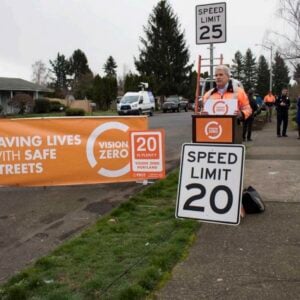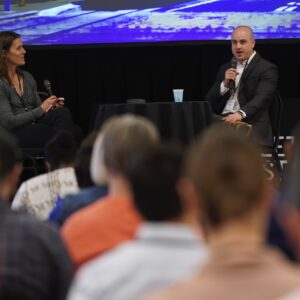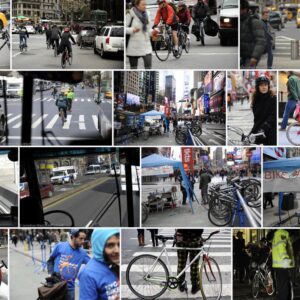The notion that 100 percent of traffic deaths are preventable is difficult for many of us (including me) to embrace. But as our local safety advocates kick off a campaign to make the concept state and local policy, this simple four-minute video by the state-funded Zero Fatalities Nevada is a powerful lesson for how to get the idea across.
If you’re interested in the ways that people’s opinions change, it’s definitely worth your time.
But you have to watch it all the way to the end.
The video has a very simple concept: person-on-the-street interviews with a dozen people, asking a series of six questions, in this order:
- How many people are killed on America’s roads?
- What are the leading causes of car crashes?
- Will we ever see a day when there are no fatalities?
- What is a good goal for Nevada?
- What is a good goal for your family?
- Should the goal be zero for everyone?
As you can see in the video above, there’s one point in that sequence where the conversations seem to have changed completely. You can probably guess where, but you really have to see the whole thing to understand how effective the question is.
(And if you’re curious about the real answers to the first two questions, you can see here that the final man they interview in each sequence is right on.)
Hat tip to reader Scott K.







Thanks for reading.
BikePortland has served this community with independent community journalism since 2005. We rely on subscriptions from readers like you to survive. Your financial support is vital in keeping this valuable resource alive and well.
Please subscribe today to strengthen and expand our work.
That needs to be about a 2 minute video.
Yep, if it was 2 minutes instead of 4 it would have 2 million views instead of 2,707. Up 300 today tho ;).
It’s interesting how people change their answer when it’s about their family. Basically, to them, it’s okay for people they don’t know to die in car crashes. The Vision Zero movement would to well to humanize the situation and not just present raw numbers that have no personal meaning.
That’s what makes this series of questions brilliant.
In more than one of the respondents, you can see the light bulb turn on in their heads once the family question is asked. In asking the and answering the questions there was no “facts” to debate or dispute.
Though the real test is if it did anything to affect the way these people drove after the survey.
I find this as one of the most infuriating things about people when they have children. Yes it’s natural to want to protect your offspring, but it becomes way too simple of a cop out for all manner of selfish, rude and unsafe (for everyone else) actions.
“Let’s not make the street safer for everyone, let me have an 8000lb armored crumple zone on wheels and the the rest of you can whistle”
Great, now ask these people if they’d be willing to vote to repeal right-turn-on-red laws to prevent crosswalk fatalities.
I would have also liked to see if people believe the trend is upwards or downwards these days and why they think that is.
The goal of zero traffic fatalities makes no more sense than zero heart congedtion related fatalities. Outlaw driving over 25mph? Outlaw eating more than 1400 a day? Sure answers change if a family member is involved but this is precisely the perspective from which we should not make public policy.
“The goal of zero traffic fatalities makes no more sense than zero heart congedtion related fatalities.”
I don’t see the equivalency you do.
Someone else’s poor diet or nicotine addiction (= increased chances that he or she will have a heart attack) poses no physical danger to me.
= long term habit, self-inflicted, private
Someone’s inattentive or too fast for conditions driving, by contrast, does pose physical dangers to self & others.
= short term behavior, poses risks to others, on public rights of way.
But to turn your equivalency on its head, we could—if we wanted to—pursue both of these goals, but since this is bikeportland perhaps we can take that conversation over to cardiacportland.com.
but do you want somebody having a heart attack while they’re driving?
Seems to be working in Sweden–certainly not down to zero yet but they’ve cut their fatality rate in half since establishing Vision Zero. And, interestingly enough, Sweden allows open containers of alcohol in MVs.
The reality is that the vast majority of traffic deaths in this country are preventable. An even higher percentage of car ped/bike fatalities can be avoided. And we can do it without making traffic worse. The real problem is our current system is biased against multi-modal use and safety. Thankfully the engineering community is finally stepping away from the ideas of the past and this coupled with a tight fiscal environment will help move us toward a smarter, safer road environment for all users.
Call me a doubting pessimist and a spoilsport, but this video and what appears to be its message is conflating what people believe is actually achievable (less, but certainly not zero) with what people would want for themselves and their loved ones (zero). One belief is based on reason, the other on emotion. To claim that there is a natural progression from one state of mind to the other that must simply be pointed out (as this video seems to to be) and embraced is, IMHO, naive.
Also holds true for:
– getting cancer
– defaulting on a loan and losing the house or car
– getting one’s bike stolen
– getting divorced
– missing a flight
– etc
“To claim that there is a natural progression from one state of mind to the other that must simply be pointed out and embraced is, IMHO, naive.”
You could, if you wanted, argue the opposite as well: It is naive/outrageous/unconscionable to naturalize our cultural acceptance of 33,000 deaths every year from automobiles; to do nothing about the fact that Barbur Blvd is one of the most dangerous stretches of roads in the Metro area; to not enforce any laws related to texting or talking on the phone while driving; to mete out paltry fines to people who drive over others, unless they stick around and were drunk.
I wouldn’t argue any of things nor do I believe would most reasonable people, because I think we all think that significant reductions in deaths are possible and should be pursued. You seem to think that it’s an all or none proposition: either we accept the status quo, or we accept “zero.”
The inability or unwillingness to believe that zero is an achievable goal in no way discounts an individual’s willingness to pursue improvements and reductions in death rates.
“You seem to think that it’s an all or none proposition: either we accept the status quo, or we accept ‘zero.'”
Would you agree that my characterization of the current state of affairs is about right? It sure looks a lot like ‘doing nothing’ from a certain vantage point. I don’t accept that as adequate, no. But I said nothing about ‘accepting zero’; I have suggested and will continue to suggest that understanding how woefully inadequate our past (¤t) approach to this subject has been is a precursor to making the kind of headway that those who have adopted Vision Zero are.
“Also holds true for:
(1)- getting cancer
(2)- defaulting on a loan and losing the house or car
(3)- getting one’s bike stolen
(4)- getting divorced
(5)- missing a flight”
The curious analogies continue.
That list of yours is interesting. But I’m not sure how useful it is to the present conversation. Some of the things on it are there because we don’t understand causality well enough(1), while others reflect social conditions like extreme inequality, low wages, poor safety net (2,3). The rest (4,5) are about human fallibility and time management. Only (1) involves the possibility of death.
But I don’t think Vision Zero’s refusal to accept widespread death and maiming on our roads and highways is really very much like these examples at all.
I think you are mixing up (a) X is a complex, difficult problem, and (b) in our society we have seen fit to treat X less as a problem than as a fact of life. Proclaiming that traffic fatalities are not a fact of life, but are something we can and should do something about is a strategic move, a rhetorical move, a reframing of the debate; a recognition, if you will, that we as a society could do better, that—in the case of the video we are discussing here—scaling up a personal insight to society as a whole is salutary, insightful. I don’t think there is anything reprehensible or naive about that.
The movement to reach zero traffic deaths could take a lesson from the airline regulators. I can’t remember the last time there was a commercial plane crash in the U.S. The airline industry has reached zero deaths by plane crash in this country (or did I miss some?) by analyzing the causes of each crash and eliminating those causes.
Of course this would mean requiring drivers to have unprecedented levels of training and oversight. It would also mean all people would need access to non-car transportation alternatives, since many would be too old or too young or too unreliable to be allowed to drive.
We’re not quite there yet for air travel, but it is orders of magnitude safer than travel by car. The key, in my opinion, is removing the opportunity for error by the operator. We can either require the operators to be highly trained, as we do for pilots, or we remove them completely.
“We can either require the operators to be highly trained, as we do for pilots, or we remove them completely.”
I don’t think those are our only two options. The Vision Zero playbook is full of other suggestions. Driving slowly enough to react in time is pretty high on the VZ list.
Safe Systems/VZ from the OECD has multiple points of attack. A Haddon matrix is a good starting point (William Haddon, Jr.). For pre, during and post crash, the following are some categories:
-Human Factors (health, age, distraction, experience)
-Medical (user health, screening, response, treatment)
-Vehicle (seat belts, automation, crash attenuation)
-Road (design and operation)
-Legal (enforcement, laws, adjudication)
-Social (perceptions, norms, history)
The logic is silly. It’s reasonable for every sports team to have a goal of winning every game — but it’s not useful to set of goal of “everyone wins every game”.
These comments are full of curious analogies.
Are you suggesting that getting around must (necessarily) include as many losers as winners? Yikes.
Fortunately the Swedes, and others are done with the Team Car always wins over Team Bike or Team Walk logic.
How many people are you fine with dying every year on the roads? Right now it’s ~33,000. So what number of people are you okay with, Brian?
“The logic is silly. …” Brian
What is the logic to which you’re referring? Describe it in at least some detail, just in the event you have a point some people reading here aren’t grasping, different from what they’ve presumed you’re implying.
At any rate, I don’t think setting an objective of eliminating all traffic deaths, is or should be analogous to competitive games. Road users aren’t supposed to be competing with each other, or trying to ‘beat’ each other as in competitive team sports. Road user should be, and many are, cooperating with each other in order to enable everyone to get where they need to go with the least amount of stress, injury or death. Improvements in this effort may certainly be possible, but the intention is already actively there.
Vision Zero sounds o.k. as an idealistic concept to, so to speak, get more people on board supporting things it’s decided are in need of being done to reduce traffic related deaths. Making roads safer to use is important for everyone. I suppose the jingoistic sound of VZ could be a tool some people may be able to use to hammer some of the woefully shortsighted planning that result in road situations such as that over on Barnes Rd at Hwy 217, discussed in comments to an earlier bikeportland story of this week.
I think verbally and psychologically beating up on people that don’t automatically buy into the Vision Zero line, isn’t going to line up many supporters. Vision Zero’s biggest weakness, may be the evangelical type pitch its proponents seem to use to try win support. That and the guilt trip strategy some people pitching VZ, attempt to use to win people over. It’s better to put it to people plain without indulging in the macabre: ‘Work with us, together, to make roads safer for everyone to use.’.
The silly logic I am referring to is “if A is good for everybody individually, then the goal should be to achieve A for everybody”. Substitute anything you want for A (avoiding traffic death, visiting Multnomah Falls this weekend, winning a basketball game).
This thread also raises the age-old question of how to set goals. Utopian goals that you know you won’t achieve? Stretch goals that are very difficult but possible (e.g 25% likelihood)? Comfortable goals that you are confident of reaching? Reasonable people disagree on the best approach. I have always been uncomfortable with utopian goals because I think it immediately gives everybody permission to fail. (And yes, I think achieving zero traffic deaths on any ongoing basis is a utopian goal.)
Except that countries where Vision Zero has been adopted are making huge strides. And the fact that they are ‘not there yet’ was understood to be a feature of this approach. It takes time to change (a) infrastructure, (b) people’s attitudes, and (c) people’s behavior while behind the wheel. Nevertheless the drop in fatalities and serious injuries are marked.
Exactly. “Vision” Zero is a mission statement, not a plan. It is meant to be the ideal case, as most mission statements are, and then broken down into strategy and tactics to achieve movement in its direction. You’ve described it well.
How about brushing your teeth in the morning. Getting dressed every day. It’s only silly logic if you pick ‘silly’ examples (such as everyone visiting Multnomah falls or winning a game.) There’s nothing fundamentally flawed about the logic. In my opinion whatever goal the average person has in there mind (sounds like it’s a few thousand deaths per year for Nevada) is the number we will approach asymptotically over several decades. If our shared aspiration is zero that will result in the least number of deaths over those years. And the point of this video is to remind us that those deaths are someones family members, and worth saving.
Remember we had zero car related fatalities 100+ years ago. That is proof that it is possible. How feasible it is depends on us.
“Remember we had zero car related fatalities 100+ years ago. That is proof that it is possible. How feasible it is depends on us.”
Before cars existed there were plenty of people being run over (and dying as a result) by horse-drawn carriages. So I’m not sure what the purpose of that statement was. Are you thinking that cars (motorized vehicles, whether internal combustion, electric, solar, steam or nuclear-propelled…) will ever disappear? No offense, but if that’s not utopian thinking, I don’t know what is.
“…winning a basketball game). …” Brian
Why you put the ‘game’ analogy in your comment, again, is anyone’s guess. Eliminating traffic deaths isn’t a game.
Straight talk, no baloney, it’s a desirable objective, a very desirable objective to conceive and put in place measures enabling road use to be safer for everyone, whether people’s use of the road is by foot, skateboard, bike or motor vehicle.
What needs to be implemented in terms of changes to road use law and infrastructure design and construction, is what people need to know, for there to be hope they’ll support the changes.
Sweden has had a big problem with excessive weekend alcohol abuse. Different from alcohol abuse in the U.S. The suggestion is that Sweden may have embraced the VZ concept, in part to accommodate that country’s citizen’s choice to binge drink on weekends.
Sources of problems leading to traffic deaths in the U.S., are different than those in the relatively small nation that Sweden is. Problems leading to traffic deaths in the U.S. are what need to be considered carefully, to generate support for measures necessary to have roads become safer for everyone to use.
Regarding Sweden’s Vision Zero and alcohol. As I understand their system they allow open containers but they have zero tolerance for alcohol in a driver’s system. Their penalties are much more severe and they set up rolling road tests–much like our southern boarder and the BP. The result seems to be that the drinking continues but the designated driver is totally sober.
Since alcohol is by far the leading cause of road deaths in this country perhaps we should be looking to their solution for ideas.
Zero tolerance for alcohol in the system of a person driving? Sure, why not. Applied as a possible measure, part of Vision Zero in the U.S., I mean that question seriously: ‘Why not?’.
Some reasons come to my mind, but I’d like to hear what other people think about the question. That is, what do people think may be the prospects here in the U.S. for implementing zero tolerance for alcohol in the system of anyone driving.
I think the liquor lobby might have something to say about that.
“I think the liquor lobby might have something to say about that.” Pete
Pete, I think you’re right. Many people that like to have a drink or two, and not have to wait four hours or however long it takes until their blood alcohol level drops to 0.00, before they can drive a car, may also object to such a zero tolerance law. Vision Zero here in the U.S. may have better success trying other means of reducing traffic deaths.
I have not watched the video yet (though I will). Will its message to me be, “Be a safer driver.” ? or will it say something about how my reliance on the car increases danger for myself and others. Safe driving is important. However by tolerating a car-centric environment we will always have injuries and fatalities.
“However by tolerating the present car-centric environment as it stands today we will always have injuries and fatalities.”
Fixed that for you.
Thanks. Perhaps there is hope.
Yes, humans are by far the main problem here. Bring on the self-driving cars! Even just as an option when people have had too much to drink, the reductions in crashes and related fatalities will be huge. We’ll see this in our lifetimes.
I likely remember only just enough of my statistics from college to embarrass myself, but I’m kind of afraid that at some point the cost of each marginal fatality prevented will be infinitely great at some point.
According to the National Highway Traffic Safety Administration, roughly 43,000 U.S. residents are killed each year in car accidents. Roughly 40 percent of those fatal crashes are alcohol-related. Nearly 2,000 people each year are killed by distracted drivers.
Altogether, over 2.9 million car accidents occur each year in the U.S. That’s over 8,000 accidents each day, and roughly 335 accidents per hour.
Though numbers seem to differ from organization to organization, most show cyclists do make up roughly two percent of all annual road deaths in the U.S., with cyclists also being involved in as many as 50,000 non-death related accidents each year.
For those outside this forum who state the answer to traffic congestion is more highways or wider highways, I say “PULL YOUR HEAD FROM YOUR ASS!”
Regardless, still way too many.
As things stand now I think some traffic fatalities are actually preferable. The freedoms society would give up to get to zero would in my estimation be worse than accepting some much lower, but reasonable number of deaths. VZ, even as a utopian dream, is flawed. I believe my opion does not prevent us from making progress toward improving traffic safety. In fact it provides a path forward clear of charged emotions and false visions.
“As things stand now I think some traffic fatalities are actually preferable. The freedoms society would give up to get to zero would in my estimation be worse than accepting some much lower, but reasonable number of deaths.”
Can you elaborate? I’m having trouble following your reasoning. What is a ‘reasonable number of deaths’?
I believe my reasoning was stated pretty clearly in the sentence about freedoms. I cannot nor should I put a number on “reasonable number of deaths”. This should not be evidence that a number can and should be determined. The number is debatable, as it should be. It will also change based on technology, improved moral sophistication etc. I won’t start that debate because I readily admit I do not know enough about it. Not knowing however exactly which number is the right number does not diminish my assertion that zero deaths is too few any more than 9 billion deaths is too many. VZ is wrong on principle although their heart is in the right place.